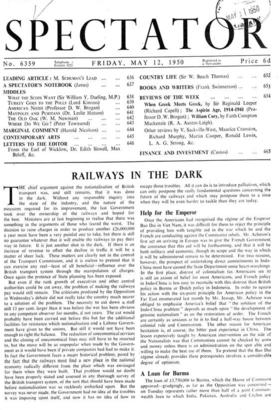Help for the Emperor
Once the Americans had recognised the regime of the Emperor Bao Dai in Viet Nam, it was difficult for them to reject the principle of providing him with tangible aid in the war which he and the French are conducting against the Communist rebels. Mr. Acheson's first act on arriving in Europe was to give the French Government the assurance that this aid will be forthcoming, and that it will be both military and economic, though its scope and the way in which it will be administered remain to be determined. For two reasons, however, the prospect of undertaking direct commitments in 1ndo- China must have caused the State Department some heart-searchings. In the first place, distrust of colonialism (as Americans see it) is still an axiom of belief for most Americans, and French policy in Indo-China is less easy to reconcile with this distrust than British policy in Burma or Dutch policy in Indonesia. In order to square his action with the six-point principle for American policy in the Far East enumerated last month by Mr. Jessup, Mr. Acheson was obliged to emphasise America's belief that " the solution of the Indo-China problem " depends as much upon " the development of genuine nationalism " as on the restoration of order. The French are certainly as anxious as he is to find a half-way house between colonial rule and Communism. The other reason for American hesitation is, of course, the bitter past experience in China. The lesson expensively taught by American intervention on the side of the Nationalists was that Communism cannot be checked by arms and money unless there is an administration on the spot able and .willing to make the best use of them. To pretend that the Bao Dai regime already provides these prerequisites involves a considerable degree of optimism.






































